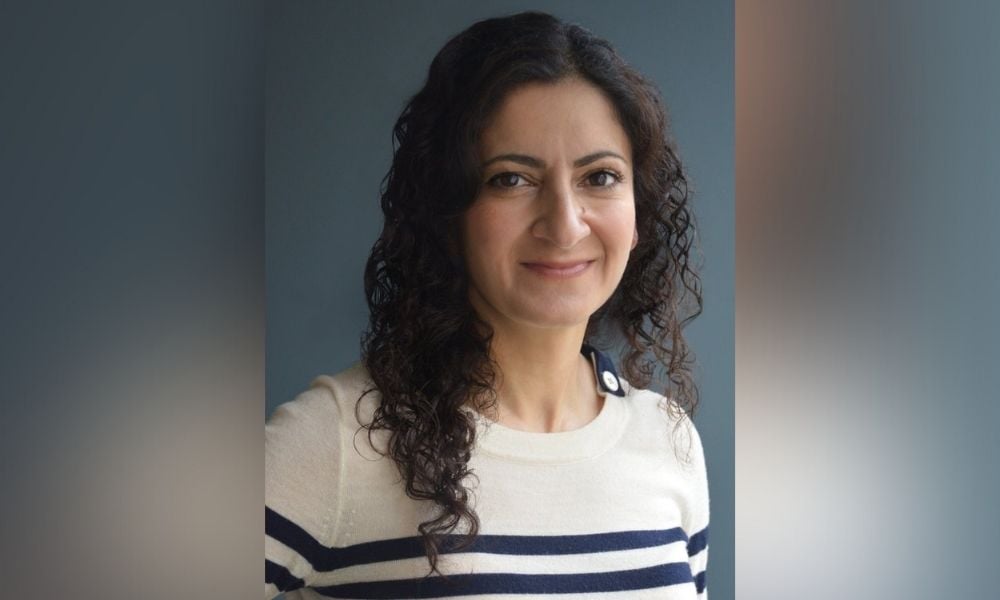
The Top 25 winner's policy work aims to dramatically improve how vulnerable students are taught

For many litigators, their work has an inherent tension. They often enter the profession to advocate for fairness but must also represent their client’s position, whether they agree with it or not.
Reema Khawja says she is lucky as senior counsel at the Ontario Human Rights Commission because she rarely has that feeling.
“There is such a strong alignment with the mandate and the goals of the commission and what I'm passionate about,” says Khawja. “Our job is to promote and advance the [Ontario] Human Rights Code. And the goal is to always take the most progressive interpretation of rights that the law will sustain.”
Khawja was one of the Top 25 Most Influential Lawyers in 2023.
She says witnessing discrimination as a child – she identifies as a racialized woman and immigrated to Canada when she was six – meant she had a strong sense of fairness from an early age. She then applied that passion to advocacy as a law student volunteer at Downtown Legal Services at the University of Toronto.
She then joined McCarthy Tétrault in the mid-1990s as a student and associate in the litigation group. “I did a lot of motions; I did some criminal matters. And I was able to participate in several trials very early on.”
Khawja enjoyed her time at the firm, which had a diverse litigation practice, including human rights and criminal work. Still, she decided to leave when her mother became unwell.
“That happened at a very pivotal moment when I was trying to decide on my career trajectory. I also had a strong sense that I wanted to do something that was more social justice aligned, more consistent with what I had really loved about doing the work at Downtown Legal Services.”
While she left the firm without another job, an opportunity arose with the Ontario Human Rights Commission as a senior policy analyst.
“It wasn't a legal job. It wasn't in litigation. Nevertheless, I decided that this was the type of work I wanted to be doing.”
Khawja worked in that position from 1999 to 2008 – with a brief secondment to the constitutional law branch at the Ministry of the Attorney General – until she accepted a position as counsel at the Human Rights Tribunal of Ontario. She began as senior counsel at the Ontario Human Rights Commission in 2010.
Her role involves being lead counsel for many high-profile OHRC initiatives, and she is responsible for all aspects of litigation before the Human Rights Tribunal of Ontario, the Court of Appeal for Ontario, and the Supreme Court of Canada.
While Khawja has represented the OHRC in many groundbreaking court cases, she says her policy work in disability and racial discrimination are career highlights.
“It's great to be able to represent individuals and help them on a one-on-one [basis], but it's even better for me if you can do it on a systemic level if you have the opportunity to do the work that could affect thousands or hundreds of thousands at once.”
Her recent work on the “Right to Read” inquiry is perhaps the best example of a broad impact. Under her leadership, this three-year inquiry heard from thousands of parents, students, educators, and organizations through submissions, community meetings, Indigenous engagements and public hearings across the province. The inquiry’s final report found that Ontario’s public education system is systematically failing students with reading and other disabilities and other vulnerable students. Ontario’s Ministry of Education and school boards across the province have announced measures to implement many of these recommendations.
“The education system isn't using evidence-based methods for reading instruction,” says Khawja. “If a child doesn't learn to read, the consequences are huge. It affects their educational trajectory, it affects their life, it affects their mental health in profound ways.”
While the report aimed to help improve the education outcomes for disadvantaged children, its conclusions will be applied to all children. “As of this year, we have a new elementary reading curriculum in Ontario that fundamentally changes the way in which early reading is taught, moving away from an approach that encourages students to guess words or predict words from context cues or from pictures in a book and actually teaching them phonics,” she says.
While Khawja’s role aligns her values with her work, she says there are challenges to advocating for the disadvantaged. “There's a high rate of burnout in the legal profession broadly, but when you're working with people who are disadvantaged, vulnerable or marginalized, or when you're working on issues where you know that the stakes are really high, it can result in some additional stressors that can lead to something we call compassion fatigue.”
But for Khawja, the impact of her work forces her to focus on excellence. “When I was working on this inquiry, I just kept thinking the work I do has the ability to profoundly affect the well-being of thousands and thousands of kids. I have got to get it right.”